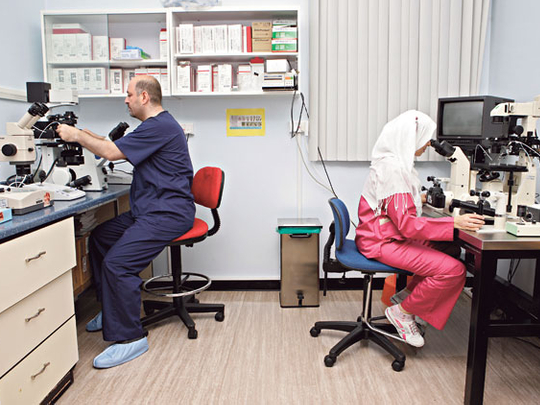
Abu Dhabi: A new price list for health-care services in the emirate of Abu Dhabi will be implemented in October, senior officials from the Health Authority Abu Dhabi (HAAD) announced in the capital on Wednesday.
While the updated price list will apply to the actual cost of medical services paid to health-care providers under the Basic product (white card), charges within enhanced insurance plans and Thiqa will also be affected as these are determined using Basic product rates.
Although health-care cost is covered in the emirate by insurance companies for nearly 2.8 million residents, officials told Gulf News that they were however unsure about whether the new set of reimbursement rates for medical services would have any impact on the fees paid by individuals.
“The proposed prices for 2012, the Mandatory Tariffs, redistribute the total cost of various medical services without causing inflation in the total price of healthcare in the emirate. The pricelist is necessary to include a range of medical services that have become available after the previous price list was set in 2008,” said Mahmoud Abu Raddaha, sections head for government prices and product benefits at the HAAD.
“While certain services will see an increase in the price due to health-care providers, a favourable impact is expected within the next two years with greater efficiency in the market,” he added.
Under the new Mandatory Tariffs, which are expected to become effective on October 15, 2012, reimbursements for doctor visits will increase 24.6 per cent, as per the 2012 price list. Prices for daycare services, which provide patients with a hospital bed for upto 12 hours on the day of a procedure, will also increase by 22 per cent, while medical service rates will increase by 0.05 per cent.
At the same time, health-care providers will receive 24.2 per cent less for laboratory services rendered, and 14.9 per cent less for surgeries. In addition, charges for radiology procedures will also drop minimally by 0.7 per cent.
The new set of prices are expected to increase the amount of time physicians spend with their patients, while decreasing the number of laboratory tests administered, HAAD officials said.
“Residents currently complain that they have to wait for upwards of an hour to see their doctors, who often prescribe a set of tests and keep consultation sessions very short. This new system therefore increases the charges paid for doctor visits, thus encouraging health-care facilities to provide longer doctor-patient visits and reduce the number of tests,” explained Dr Sultan Al Daheri, director of health system financing at the HAAD.
Abu Raddaha added that many in-patient beds are also being used for surgeries that may require less than 12 hours of stay at the hospital. This therefore prompted officials to increase the reimbursement for daycare services under the new tariff system.
“Within the next two years, we hope to see health-care facilities shift 5 to 7 per cent of their in-patient cases to daycare and outpatient services whenever possible,” he added.
A 14 per cent increase in reimbursement for home care services has also been outlined in the new price list. Abu Raddaha told Gulf News that the HAAD had received 30 to 40 complaints last year from Emiratis about the shortage of homecare.
“With the new tariff on homecare, we hope to see an increase of 25 per cent in these services offered over the next few years,” he said.
While the Mandatory Tariffs will apply to services on the Basic product, premiums for other insurance products such as Thiqa and Enhanced plans will be determined by insurance companies.
“The price for a medical service on the Basic product is the minimum available in the market, and insurance companies can have a maximum of three times this price for the same service on their various Enhanced insurance plans. Because health-care market efficiency is expected to improve, we do not believe insurance companies will definitely increase their insurance premiums or charges due for insured members,” Abu Raddaha explained.
As it stands, hospital revenues are expected to decrease up to 7 per cent or increase up to 12 per cent, based on the mix of medical services offered and the complexity of cases treated, Abu Raddaha explained. On the other hand, a typical Abu Dhabi clinic, which provides 80 per cent doctor visits and 20 per cent laboratory tests, could see a 12 to 15 per cent increase in revenue.
Workshops have already been conducted by the HAAD to familiarise health-care providers and insurance companies with the new rates. Health officials added they would consider holding similar workshops in the future to evaluate customer feedback on the updated tariffs.
With additional inputs by Tamara Suleiman, intern at Gulf News












